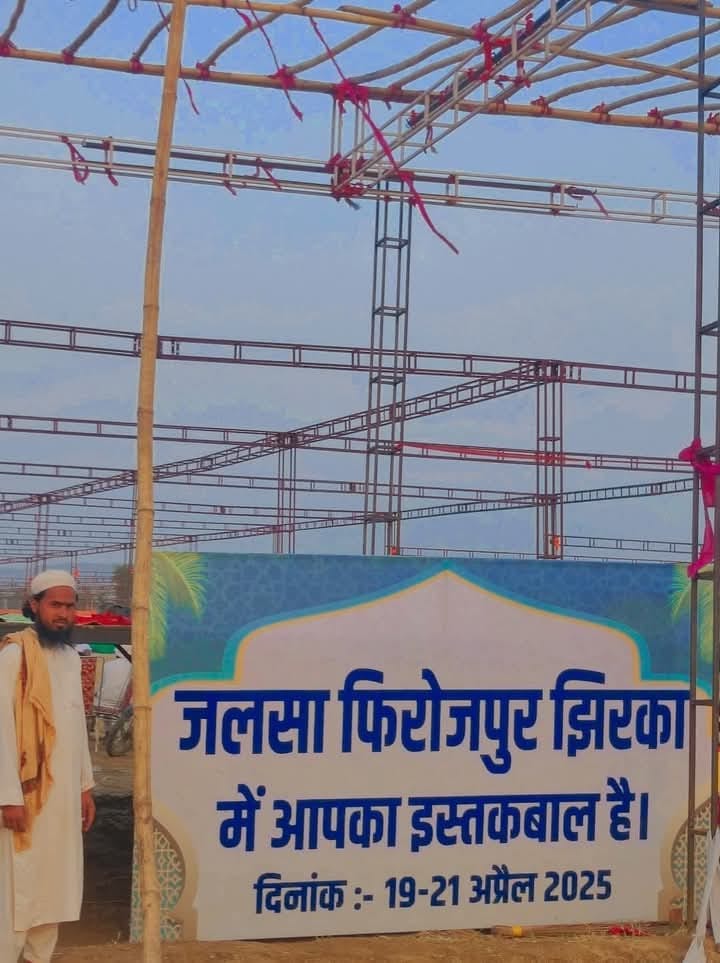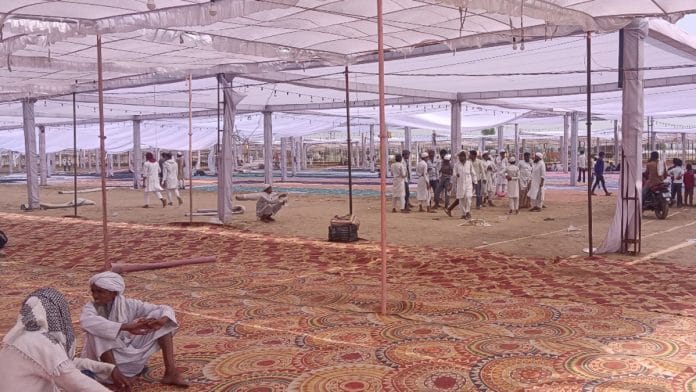Gurugram: As Tablighi Jamaat gears up for its largest congregation ever in Haryana’s Nuh district from 19-21 April, the organising committee is treading with caution to ensure the event remains peaceful and controversy-free—particularly when it comes to food.
For the first time in the Jamaat’s history, a grand three-day Ijtema (religious gathering) is being held in Ferozepur Jhirka, the historic town in Nuh, which is part of the larger Mewat region where the seeds of the Tablighi movement were sown nearly a century ago in 1926.
With over 15 lakh Muslims from across India and abroad expected to attend, the scale of the event is unprecedented for the region.
But with the size comes a heightened sensitivity to local socio-political dynamics—especially the threat posed by self-styled gau rakshaks (cow vigilantes).
To avoid any spark that could lead to communal tensions, the Intzamiya Committee (organising committee) has issued strict instructions: only chicken biryani will be permitted at food stalls, and vendors must steer clear of biryani made with meat from larger animals like goats or buffaloes.
“We don’t want any confusion that could cause trouble,” said Akhtar Alvi, a senior member of the organising committee. “Chicken meat is visibly different, and unlike gosht from larger animals, it can’t be mistaken for beef. We don’t want gau rakshaks or the administration to raise objections during such a spiritual gathering.”

Alvi added that biryani made with goat or buffalo meat is common at stalls during such events due to its popularity, but the committee has chosen caution over tradition this time.
Vendors violating this advisory could face action, he warned.
In the past one decade, the Mewat region, spread across parts of Haryana, Rajasthan, Uttar Pradesh and Delhi, has witnessed multiple incidents where Muslims transporting cattle or suspected of selling beef were assaulted—often fatally—by cow vigilantes.
In one case, Pehlu Khan, a dairy farmer from Nuh, was lynched by a mob near Alwar in 2017 while transporting cows. In another chilling incident, Nasir and Junaid from Rajasthan were abducted from Mewat region, beaten, and killed by cow vigilantes, with their charred bodies later found inside a burnt vehicle in Haryana’s Bhiwani district in February 2023.
And in July 2023, communal violence erupted during a Vishwa Hindu Parishad (VHP) Brajmandal Jal Abhishek Yatra in Nuh, triggered in part by the announced participation of cow vigilante Monu Manesar, a suspect in the lynching of the two Muslim men. The clashes left at least seven dead and more than 200 injured.
The Tablighi Jamaat, founded by Hazrat Maulana Ilyas Kandhlawi in 1926-27, began its mission of (propagating Islamic preaching) from Nuh itself.
It later spread its footprint across the globe, making it one of the largest Islamic revivalist movements with presence in over 150 countries. The Mo’in-ul-Islam Madrasa in Nuh is one of the oldest institutions affiliated with the Jamaat. Every Friday, thousands gather here for prayers, reaffirming the town’s identity as a spiritual nucleus of the movement.
While Tablighi congregations are held regularly across states—the most recent one being in Rajasthan—this is the first time a full-fledged Ijtema is being held at Ferozepur Jhirka in Nuh. The scale of the event is massive. Spread across 121 acres, with 21 acres covered with tents and the rest for seating, parking, water and sanitation, the arrangements have been underway for four months. Temporary toilets have also been set up created using plastic sheets, and a team of experts has been supervising logistics, said Alvi.
Emergency services and volunteers are on standby, but no police will be allowed inside the main event premises—all security will be managed from outside, Alvi added.
Maulana Saad, the Amir (chief) of the Tablighi Jamaat based at Delhi’s Hazrat Nizamuddin Markaz, is expected to address the gathering, along with several other senior clerics.
Despite its strictly religious focus, the event has also drawn curious Hindus in the past. “People from all communities come to see what it’s about,” Alvi said. This is one of the reasons food served by the organisers, he said, also includes puris, aloo sabzi, and halwa.
The infamous Nizamuddin Markaz episode during the Covid-19 lockdown brought Tablighi Jamaat under sharp national scrutiny. This time, the organisers are making sure nothing derails the spiritual focus of the gathering.
(Edited by Amrtansh Arora)
Also Read: Possible that cops picked up 36 Tablighi foreigners to ‘maliciously prosecute’ them — court







The Tablighi Jamaat must make it’s position clear on the Murshidabad riots. What exactly is it’s stand on the death and destruction caused by rampaging Muslim mobs in Bengal?